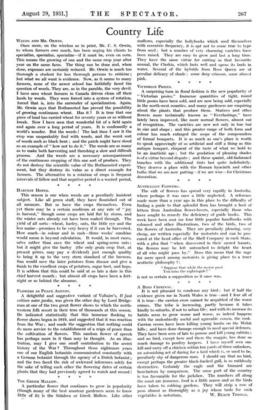Country Life
WEEDS AND MR. ORWIN.
Once more, on the wireless as in print, Mr. C. S. Orwin, to whom farmers owe much, has been urging his clients to specialize, specialize, specialize—if it must be, even on corn. This means the growing of one and the same crop year after year on the same farm. The thing can be done and, when done, expenses are certainly reduced. Mr. Orwin is much too thorough a student for less thorough persons to criticize ; but what we all want is evidence. Now, as it seems to many farmers, none of the newer school has faithfully faced the question of weeds. They are, as in the parable, the very devil. I have seen wheat farmers in Canada driven clean off their lands by weeds. They were forced into a system of rotation, forced that is, into the surrender of specialization. Again, Mr. Orwin says that Rothamsted has proved the possibility of growing continuous wheat. Has it ? It is true that one piece of land has carried wheat for seventy years or so without break. Now I have seen that wonderful bit of a field again and again over a long period of years. It is confessedly a world's wonder. But the weeds ! The last time I saw it the crop was unspeakably foul with weeds, and the worst sort of weeds such as black bent ; and the patch might have stood as an example of" how not to do it." The weeds are so many as to make both harvesting and threshing a slow and difficult process. And the weeds are a necessary accompaniment of the continuous cropping of this one sort of produce. They do not destroy the scientific value of the Rothamsted experi- ment, but they destroy its value as a direct example for farmers. The alternative to a rotation of crops is frequent intervals of fallow and that negative period is a wasted period.


























 Previous page
Previous page